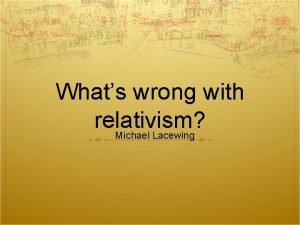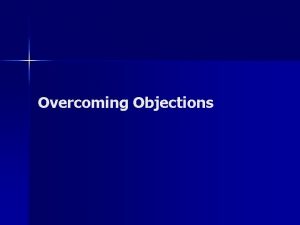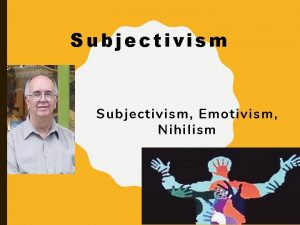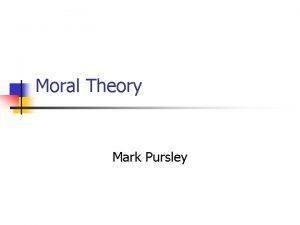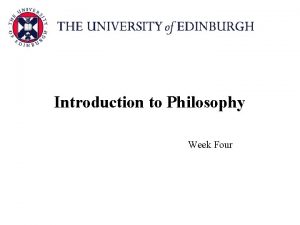Emotivism Michael Lacewing enquiriesalevelphilosophy co uk Cognitivism v














- Slides: 14

Emotivism Michael Lacewing enquiries@alevelphilosophy. co. uk

Cognitivism v. non-cognitivism • What are we doing when we make moral judgments? • Cognitivism: moral judgments, e. g. ‘Murder is wrong’ – Aim to describe how the world is – Can be true or false – Express beliefs that the claim is true • Non-cognitivism: moral judgments – Do not aim to describe the world – Cannot be true or false – Express attitudes towards the world

Subjectivism • Moral judgements assert or report approval or disapproval – E. g. ‘X is wrong’ means ‘Most people disapprove of X’ – This is a cognitivist theory • Obj: racism is wrong, even though, historically, most people have approved of it

Speaker subjectivism • ‘X is wrong’ means ‘I disapprove of X’ – Again, cognitivism • Obj: (if we know what we think) we cannot make moral mistakes – Why deliberate? • Emotivism: Moral judgments cannot be true or false – ‘X is wrong’ expresses disapproval of X

Ayer’s emotivism • The verification principle: a statement only has meaning if it is either analytic or empirically verifiable • Moral judgments are not analytic and cannot be shown to be true or false by empirical verification • Therefore, they are literally meaningless, stating neither truth nor falsehood

Ayer’s emotivism • ‘If I say to someone, “You acted wrongly in stealing that money” … I am simply evincing my moral disapproval of it. It is as if I had said, “You stole that money, ” in a peculiar tone of horror’. • Moral language expresses our feelings and arouses feelings in others to influence their action

Rejecting the verification principle • According the verification principle, the principle itself is meaningless. – ‘a statement only has meaning if it is analytic or can be verified empirically’ is not analytic – and cannot be verified empirically. • If the principle is meaningless, it is not true. • If it is not true, it cannot show that religious language is meaningless.

Ayer’s response • The principle is intended as a definition • Whether it is the right definition of ‘meaning’ is established by arguments about its implications • Objection: If we are not convinced by the implications, we will not accept it as a definition • The principle provides no independent support for thinking that moral judgments are non-cognitive

Stevenson • On beliefs and attitudes – Beliefs: mind-to-world direction of fit – Attitudes: world-to-mind direction of fit • Descriptive and emotive meaning – Central terms (good, bad, right, wrong) are only emotive – Others, e. g. ‘lie’, ‘respect’, have both meanings

Stevenson • Emotive meaning is connected to use: the purpose is not to state facts, but to influence other people’s behaviour • Obj: but much emotive language is not about morality, e. g. advertising – What makes emotive language moral? – If we appeal to distinct emotions expressed, e. g. disapproval, what makes moral disapproval moral (rather than aesthetic)?

The limits of value • Non-cognitivism doesn’t identify any limits to morality, because it equates morality with approval or disapproval – If what we value isn’t restricted by what is objectively valuable, it seems we could approve or disapprove of anything. – But morality isn’t about just anything, but about sympathy, courage, happiness, etc. – it is about what is good for people.

On ethical language • Ethical language doesn’t always function to influence others • Ethical language isn’t always emotive • Reply: The purpose of ethical language is to influence others, and this provides its core meaning – But this is compatible with some noninfluential uses and some non-emotive uses

Moral argument • If moral judgments are just expressions of attitude, then the attempt to influence others is not rational • Ayer: moral argument is only ever argument over facts – There can be no argument over values • Stevenson: moral argument is a disagreement in attitude – Attitudes have implications for other attitudes

Moral argument • But there is no rational process of deciding which attitudes to keep – What reason do we have to change our minds? • If the purpose of moral judgment is to influence others, any argument that is effective will be a ‘good’ argument – There is no rational criterion • Worse: an argument is valid if the conclusion must be true if the premises are – But if moral judgments are never true (or false), no moral arguments are valid!
